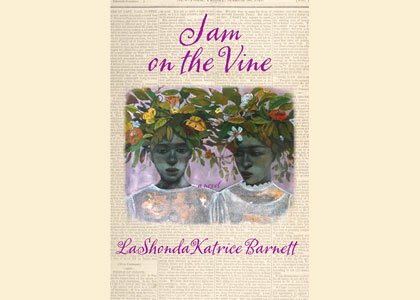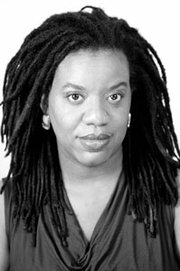“Jam on the Vine,” the debut novel by author LaShonda Katrice Barnett is a lush historical novel set at the turn of the 20th century that sheds light on black life in America post-emancipation. The story follows Ivoe Williams, the daughter of a Muslim cook and a metal smith from her humble beginnings in central-east Texas to her trailblazing career as a journalist and the first African American female newspaper publisher. Along the way Ivoe goes to college, discovers her sexuality and chronicles the injustices of Jim Crow.
(Photo: Rachel Eliza)
LaShonda Katrice Barnett
The Baltimore Times recently spoke to Barnett about her new book, boxing, and what she loves about Charm City.
BT: What inspired you to write ‘Jam on the Vine?’
LKB: I come from a family that has always revered the black press. The black press really had significant import in my family when I was growing up. So I thought that I would build a novel in which an African American woman character starts her own newspaper.
BT: If you could back in time and meet a figure from history, who would that be?
LKB: Certainly Ida B. Wells who inspired my protagonist, Ivoe in “Jam.” She’s been a hero of mine forever. I remember that she was the first person that I wrote a black history report on in 3rd grade. I mean, she single-handedly took on an anti-lynching crusade at the end of the 19th century and really exposed all of the rumors and the accepted logic for why black men were supposedly being lynched. She was really a powerhouse. I’d definitely want to meet Ida B. Wells.
BT: You’re very clear in the novel that Ivoe is gay. Why is her sexuality important?
LKB: I wanted to create a lesbian character on purpose because I feel that one of the ways American culture maligns black gay people, in fact all gay people, is by erasing us from history. So when I was writing this story I thought this is a prime opportunity to make thisL woman who launches a black newspaper also queer, just to point out the fact that black gay people have always been here.
BT: There’s a scene in the book where the father, Ennis takes his youngest daughter to a music store where she is molested by police as Ennis helplessly looks on. Was that scene as hard to write, as it was to read?
LKB: Ennis is simply trying to buy a cylinder, what we call a record, for his daughter and because he is a black man who has money, he is accused of a crime he did not commit and his daughter is molested right before his very eyes and he can’t do a damn thing about it.
My people actually come from the same area in Texas where the first half of “Jam” unfolds and those stories are prevalent. The ways in which— even after emancipation and even with freedom— the very fine line people always had to walk 24/7 because any act that was considered out of place could result in you losing your life. That was a very hard scene for me to write because I was very much in touch with the stories where family members and family friends were completely innocent and were embarked upon something very basic, something as simple as buying music and being caught up in a heinous situation like Irabelle and her daddy and the sheriff.
BT: What was your favorite part of the story to write?
LKB: I loved writing about Ivoe going to college. I can’t think of a novel that features an African American female character that is allowed to go to college and to pursue her love for learning and a career, not a historical black novel, so I was very proud to be able to tell that story and delighted to follow a black woman living at the end of the 19th century and early 20th century onto a college campus. A lot of our ancestors made their way out of no way which is what Ivoe’s parents do. Lemon and her husband Ennis, they find a way to make sure their daughter goes off to school to become somebody and I was very excited to be able to write about that.
BT: You talked about balance. It was striking how you realistically described the dangers of being African American in the early 20th century, but you also offer some hope.
LKB: it was very important to me to write about a functional black family and it was also the only way that I could get through the novel. I thought to myself, historically speaking, Jim Crow was always at the backs of black people’s minds. You could not set foot outside your house without worrying about whether or not you were going to make it. That’s just the truth of the matter. Every single bit of research that I put my fingers on underscored this point. It was a very dangerous time. So I thought I have to bring some light into this story. Because the fact of the matter is we’re still here. It wasn’t always horrific. We are a people capable of passion and love and ingenuity and that to me explains why we’re still here. If you’ve got Jim Crow at your back when you leave the house, then at least inside the house let’s create an atmosphere of love.
BT: Your character Berdis, ends up working at the Belvedere hotel in Baltimore. What is your connection to the city?
LKB: (Laughing) I don’t have a connection to Baltimore! Last week I was in Mt. Vernon at a lovely B&B called Empire House and when I got out of the cab to go to the bed and breakfast right next door was the Belvedere where Berdis works! I just chuckled. As soon as I dropped my bag off I went in to the Belvedere I walked all around the hotel and had a meal at a restaurant called the Owl. I was so tickled that I was there. I wanted to show different parts of America and that’s probably because of my scholarly interest in American studies, my Ph. D in American studies. That’s why I have Ivoe going to Omaha and Ennis is in Kansas and I wanted Berdis to come east for the Peabody Conservatory. That was my draw to Baltimore and I like Baltimore. It’s an interesting city, especially artistically speaking. There’s a very rich writer’s scene because of Johns Hopkins Creative writing program so it’s a city full of poets and fiction writers. There’s a lot happening here. It’s full of character.
BT: What’s your next project?
LKB: I’m working on chapter 6 of my new novel called “God’s Follies.” It’s set in Manhattan during the gilded age. I love historical fiction and it’s a heist story. It’ s about two women that pull off a great heist. So it’s a very different story than “Jam” but it is historical and it will introduce you to a little known African American character, a woman by the name of Stephanie Sinclair who was very famous and who lived in Harlem during the 1920’s. Just like Ida B wells inspired the character Ivoe, Stephanie Sinclair has inspired the new character. Thank God for black women’s history! I will be busy for the rest of my life!
BT: What ‘s a fun fact you’d like to share about yourself?
LKB: I like to box and I’m a major jazz head. Outside of my poodle and my human relationships, I love jazz more than anything on the planet. I was talking to a friend of mine who is a well-known bass player and he reminded me that so many jazz players also boxed. Miles Davis was a fantastic boxer and he could
have had a career. He had to choose between the trumpet and boxing he was so good.
BT: What role does the black press have to play in today’s world??
LKB: It’s critical because even though the mainstream press supposedly still has its eye on black America we know at the end of the day that’s not true. I can tell you how many times I’ve seen stories that are particular to black America in the New York Times; not often. The black press is as important today as it was 100 years ago because journalists who write for black newspapers are our boots on the ground. They’ve got their ear to the vine and they are the ones still today in 2015 who are capturing the stories that are crucial to black lives.
The event features three women writers discussing the intersection of place, time and culture in literature and in the lives of women. The conversation will be moderated by Linda A. Duggins, Hachette Book Group.

